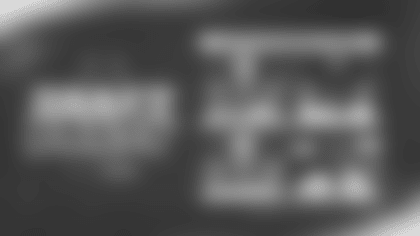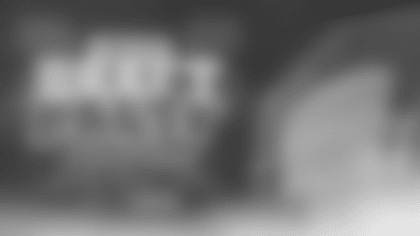Bill Polian, in his 12th season as Colts president, has a resume
unique in the NFL. One of two men to win NFL Executive of the Year
five times, Polian in the 1980s built the Buffalo Bills into a
four-time Super Bowl participant. In the mid-1990s, he built the
expansion Carolina Panthers into a team that made the NFC
Championship Game in its second season, 1996. Since joining
Indianapolis in 1998, he built the Colts from a 3-13 team in 1997
and 1998 into one that has made the playoffs 10 of the last 11
seasons, including an AFC Championship Game appearance after the
2003 and 2006 seasons, AFC South titles in 2003, 2004, 2005, 2006
and 2007 and a Super Bowl championship following the 2006 season.
Each week during the season, in The Polian Corner, Polian and
Colts.com will discuss issues pertinent to the Colts and the rest
of the NFL.
**
* *Question: The Colts clinched a sixth AFC South title in seven years Sunday. A remarkable run during the first eight seasons of the division's inception . . .**
**
Answer: It is a major [step]. It's our first goal every
season, to win the division and guarantee ourselves a home game. We
are guaranteed a home playoff game. Now, we'll do our best to
continue our quest and see if we can the best possible seed we can.
We have a very hot opponent coming in here [Sunday] in the
Tennessee Titans, who are riding a five-game winning streak.
[Titans quarterback] Vince Young is as hot as can be. We've got a
tough test ahead of us, and we'll just keep after it. It's nice to
have achieved Goal No. 1. Let's get on to the rest.
Q: A 35-27 victory over the Houston Texans Sunday – and yet another comeback, this one from 17 points down. Talk about the grit in this team. The players just never quit . . .
A: I think it's a very gritty, gutty football team. They have a lot of confidence in themselves and in each other. I told one national reporter [Monday] that [quarterback] Peyton [Manning] is playing as well as he ever has played, given the fact that he's breaking in new receivers, that the offensive line play hasn't been what it was in the 49-touchdown season [of 2004] and as a result, our running game – even though the running backs are running tremendously well – isn't what it was in those days. He has had to shoulder more of the burden. But we're getting great help from the running backs. Our receivers grow every day. [Wide receiver] Pierre Garcon is turning into a run-after-the-catch threat that we've never had here, quite frankly, as well as a tough guy who dishes out as much punishment as he takes. [Wide receiver] Reggie [Wayne] is playing as well as he ever has played. [Tight end] Dallas [Clark] is having his best statistical season and playing as well as he ever has played, which is great every year – he should have gone to the Pro Bowl the last couple of years. We're making do on the offensive line, which is a tribute to their courage and grit and toughness. Defensively, although we were beaten to the punch [Sunday] – they went back to their old game plan they used to beat us the only time they've beaten us before; down there, a couple of years ago [2006] – and it took us about a quarter and a half to get adjusted to that. Once we did, and got the bootleg game under control and reestablished control of the line of scrimmage, then it was our game from there on in. Our defense, with the exception of the 2005 defense, when we went 13-0, is the next best defense that we've had. Even without Marlin, Bob, [linebacker] Tyjuan [Hagler] and [cornerback] Kelvin [Hayden] for virtually the entire season, it's still as good or better than any other than the 2005 group. That has helped greatly as well. Our special teams never have played as well in the coverage areas, and that's the most important part of that game. We've had consistent kicking, whether it's [kicker] Adam [Vinatieri] or Matt [Stover]. Everything has been good. The one thing we don't do is lose our poise, lose our cool, and the one thing we do is play 60 minutes. The NFL's slogan is, 'Play 60,' and we have adopted it and accepted it and lived up to it.
Q: Did you ever think 'Next Man Up' would go this deep?
A: No, I did not. That part of it has been tough, but it's a tribute to all of our players that they have accepted that and they have stepped up and done what they had to do. They're very professional. One of the things [Senior Offensive Coordinator] Tom Moore said [Monday] in our meeting was, 'We handled the adversity that came in that game like true professionals.' We had a lot of young guys out there playing, but they played like professionals. That win, perhaps more than any other we've had this season, really belongs to them. That was a tired football team on the road in a situation where the other club was desperate. A lot went wrong – most of it our own doing – in the early part of the game, but we overcame it and came back and won the ballgame going away, which is very much to their credit. (We're) very proud of them.
Q: Tennessee is a hot team coming in. Have the Colts played a team that hasn't been hot this season?
A: It seems like everybody we play is the next big thing in the National Football League. 'The team nobody wants to play' is our next opponent. In this case, it probably is true, because they have a great defense. Their defensive backfield is healthy. It was not when we played them last time. They have a ferocious rush line, which really, really gets up for playing us, as you might expect. And Vince Young is unorthodox, so it's not easy to prepare for him, because he does things in an unorthodox fashion. He does them well, obviously, but he's different from other people that you see, so it's really a challenge to play them, but coupled with his efficiency and his ability to make big plays – three fourth downs on Sunday on the drive that culminated in winning the game – coupled with that kind of a ferocious defense is a pretty darned good combination.
Q: Has there been improvement in Young from two or three years ago?
A: Absolutely. You saw it Sunday night. They tried to squeeze him off the corner and mush rush in the middle and he would step up, avoid the corner rushers and just deliver the ball. That's where that height, quick release and strong arm come into play. He went 99 yards with little or no time left on the clock. That's all you need to know about Vince Young. That's outstanding.
Q: Can you discuss Manning's glute injury? Is it affecting his play or his passing?
A: I don't think it's affecting either. How do I say this delicately? The glute is the backside. The second [interception Sunday] was a little bit of a miscommunication between the receiver and he, but there was pressure, which did not allow him to wait until Reggie cleared that defender. He had to release the ball a little bit early. In both cases, there were extraneous circumstances. But, listen: those things are going to happen. We won the football game. Again, I've said this from the start of the year on: do not subscribe to the theory that you have to throw for 350 yards, four touchdowns, no interceptions, that you have to allow the other team 170 yards total offense, that you must sack the quarterback four times and have four turnovers or else you don't play a good game. That's not true in the National Football League. It may be at the high school level. It may be if you have a Division I-A school playing a Division I-AA school, but it certainly is not true in the National Football League. That's the bar that so-called experts set, which is completely unrealistic. The rule of thumb for years and years among football professionals has been, 'Have twice as many touchdown passes as interceptions – the ratio is 2:1 – and that's perfectly acceptable. And be careful with the football.' Peyton is nothing if not careful with the football. And, if you are among the best teams in all of professional football – among probably the top four – your turnover ratio, takeaway-giveaway ratio, will be 2:1. If it's plus – let's say five takeaways to four giveaways – you're likely to have a winning season. If you're 2:1, you're likely to finish with 13 or 14 wins. Again, don't accept the unrealistic benchmarks that are created by outsiders.
Q: Colts Head Coach Jim Caldwell said at halftime the Colts needed to get control of the line of scrimmage again. Was it that simple?
A: It was that simple. That's absolutely right. They were beating us to the punch because of their scheme on the line of scrimmage – their offense versus our defense. And our offensive line was being beaten to the punch by their defensive line. Once we rectified that situation, which we did, it became a different football game.
Q: Should the Colts and New England Patriots play again, how do you plan on containing [quarterback] Tom Brady and [wide receiver] Randy Moss?
A: Well, we've already played them, so unless we meet them again in the playoffs, that's the last we've seen of them. We won't play them again unless we see them in the playoffs. We'll cross that bridge when we come to it. We'll take a look at the tape and, as [former Baltimore Ravens Head Coach] Brian Billick said in an interview, 'What teams look like today are not what they will look like in January.' That's very true. What he meant by that was, 'Injuries determine so much about the efficiency of how your team is playing and who your weapons are and how you play that a team that looks like a world-beater right now could look very, very different come the second week in January.' We'll deal with whoever we have to play at that point in time.
Q: On the Sunday Night Football pregame show, former Colts Head Coach Tony Dungy was discussing the Colts' hand signals on offense. Why does he do that?
A: I don't think he's giving away much that people can't get on tape or television. He's just explaining the process of what's going on without revealing what the keys to the signals are. It's not unlike going to a baseball game and watching the third-base coach give signs. Unless you know what the indicator is and how the signs are to be read and interpreted, you see him going through the motions and you might say, 'Well, I think that if he hits his cap that's the hit sign,' or, 'If he hits his leg, that's the steal sign,' but the likelihood is that's not the case. That's what we have here. The real issue and the real troublesome part with our offense is if you had audio of it and you could match the calls at the line of scrimmage to the actual play being run. That would give you much, much better information than Tony revealed on television. I did not see it. I talked to Tony Monday, but I did not see the show. We did not get home in time to see it, but knowing Tony as well as I do, he's not giving away any valuable information.
Q: Do people talk too much about the Colts' injuries? The players playing have done a great job, it seems . . .
A: You can't give credit enough to the guys who have stepped in and played, to the 'Next Men' who have stepped up and done a great job. Surely, you miss great players. We went into that game Sunday with five starters out on defense – Tyjuan Hagler, Bob Sanders, Kelvin Hayden, Marlin Jackson, [defensive end] Dwight Freeney. That's about as far as you can stretch the rubber band. That's about as far as you can go. I mentioned that to [Bob] McNair, the owner of the Texans, before the game and he didn't give me much sympathy, nor did I expect he would. The bottom line is you can only stretch so far. But we have had such wonderful contributions from everybody who has had to come in and play – and of course, [Antoine] Bethea and [Melvin] Bullitt are two prime examples – that we've been able to overcome that. At this point, I'll be very honest with you: it's a paper-thin margin. We've got to stay healthy the rest of the way, and Jim Caldwell is taking every possible step necessary to see to it that happens.
Q: Do you feel good about getting Hayden back?
A: We'll get him out in practice this week. We anticipate that he will practice and we'll see how he does. We'll ramp him up as the week goes on. We'll see how he does. I can't say right now for sure he's a go, but we're at least optimistic.
Q: Would you ever sign a player right out of high school without him playing in developmental league or college?
A: No. First of all, we have an eligibility rule that has been in place for quite some time – since at least 1987 or 1988 – that requires that a student wait three years after high school before he is eligible to play in the NFL. That was tested in the Supreme Court by Maurice Clarett, the former running back at Ohio State. The Supreme Court upheld our position and reversed a decision in Maurice Clarett's favor at the lower level, at the district-court level. So pending some change in that in our Collective Bargaining Agreement between the NFL Players Association – the players' union – and the NFL Management Council, which is the NFL's bargaining arm, that policy remains the law of the land. So, a high school player – for good reason, by the way – could not sign a professional contract and play in the NFL. The reason is that a 17-, 18-, 19- and even 20-year old boy is not mature enough physically to stand the physical pounding he would take over the course of an NFL season. It would be injurious in the extreme to his health. So, most players – and there are only a handful who have done this – go via the Canadian Football League. Cookie Gilchrist is one that I remember. He was a great fullback for the Buffalo Bills in the American Football League. Recently, there was a running back from Oklahoma who dropped out of Oklahoma after his freshman year [Marcus Dupree] – a great running back who went to the United States Football League and unfortunately tore up his knees and never had a long career. Of course, Herschel Walker left the University of Georgia early and went to the United States Football League, but our policy is firm. You have to be three years out of high school, and then you're eligible to come to the National Football League. Of course, then you must prove yourself via the various scouting combines, tryouts, etc.
Q: Something was written a short time back in the newspaper that the NFL had mandated that the Colts and Patriots play every year. Can you elaborate?
A: I can't elaborate on what it's alleged that the newspaper said. If that is the case, it's incorrect. The NFL scheduling format is in place and will remain in place through next season and 2011 as well. You play six games in your own division, the AFC South. You then play another division of your conference. In our case it rotates every three years – AFC East, AFC North and AFC West. You play home and home, and the site is determined by rotational policy. You play those teams once every three years. The sites alternate each time you play. Then, you play what I like to call, 'seeding games,' which are based upon where you finish in the standings. Then, the sites of those games are determined on a rotational basis as well. It just so happens that because the Patriots and Colts have finished one and two in our divisions every year that we have played on that basis. Because the home site on the rotational games, the so-called seeding games, are pre-determined, we've been home for the last two. But I think we were at Foxboro for the previous five, if I'm not mistaken. That's how it works. It is not predetermined that we play every year. Not at all. It just so happens that both teams have been good enough that when we were not rotating with the AFC East, we were getting them on a seeding game.
Q: What are your thoughts on the more aggressive defense this season, and does it seem there are more players this year on the Colts with long hair?
A: There are no changes on hair. We don't have any rules on hair. They can have their hair any way they like so long as it's determined by the trainers and the doctors that it's safe under their helmets. If they have dreadlocks or ponytails or whatever else, that's perfectly OK, as long as they're not putting themselves at physical risk. With respect to the blitz package, we did install in the offseason a new blitz package because we felt like the trends were leading us that way. We felt that we needed to have a package whereby we could dictate some pressure other than from the front four in certain situations. Sometimes, we'll play man-to-man when we do it and other times we'll play zone. One play occurred in the first half [Sunday], a pass to [wide receiver] Andre Johnson, and we were in a zone in that situation. We just didn't get him covered in time. He's a tough cover, obviously, and a very great player. We feel like on balance it has been good to us. The blitz package was part of the situation that caused Tom Brady to throw that ball high, which we almost intercepted on third down prior to the famous fourth-down call in the New England game earlier this year. It has been quite successful for us. [Linebacker] Freddy Keiaho had a great blitz at the end of the game [Sunday] that really made it tough on them and made them use some clock, which we wanted to do. It has been good to us. They're going to make some plays on it. Anytime you blitz there's a risk, but by and large, it has been good to us.
Q: What had made the Colts so successful in recent seasons?
A: The credit belongs to the players and coaches who ultimately have to go out there and perform every week. The organizational credit starts with [Colts Owner and Chief Executive Officer] Jim Irsay, who is a phenomenal owner, and who has given us everything we need – whether it be money to sign players, money to build a facility here that's second to none in the National Football League, the resources to keep our coaches, and the confidence in the organization to make sure that as we transition from Tony to Jim and eventually from me to [Vice President and General Manager] Chris [Polian], that we continue the core values that have made us successful. It starts with Jim, then goes throughout this building to everyone that works here. That's where the credit belongs. It's a privilege and a pleasure to work here, and I'm looking forward to being here for a little while yet.
Q: You haven't decided when, have you?
A: No, but it's not anytime soon.
Q: Can you comment on your philosophy behind whether to rest players late in the season?
A: Let me start by talking about fact versus perception. I'll go back to 1999, when we went 13-3. We went to Buffalo in January for the last game of the season exactly as we will this year. The only thing that was at stake was seeding in the playoffs during the first week. We did not have the new division at that point in time. We were fighting with Jacksonville for a seeding position. We had decided that we would play our guys, our first-teamers, until such time as the Jacksonville game got out of hand. They were playing a favorable opponent, and we anticipated they would win it. Lo and behold, for the first quarter and a half, the score was close. So, we left our starters in the game and [linebacker] Cornelius Bennett – who spent only one year with us, but who was the lynchpin of our defense at a time when our defense was nowhere near as good as it is today – went down with a knee injury from a low block. It finished him for the playoffs. We came in against the Tennessee Titans here, lost in a tight ballgame where our defense gave up a 60-yard-plus run to Eddie George to lose the ballgame, and they went on to play in the Super Bowl, and we went home. That's a fact, and I can recite all of the facts surrounding that situation because I've never forgotten it. That is the price you pay for playing players in meaningless games. I can assure you that if a game is meaningful, every player on our team is going to be out there. We can also address the rust situation by practice. You don't get rusty missing a half of a ballgame or three quarters of a ballgame. That doesn't happen. That is fantasy. There is nothing to it. I don't believe in momentum. I don't believe there is any such thing as momentum, and I heard from Tony Dungy today that he has heard from other people around the league that there were a couple of instances where players who were forced to play at the end of a season when everything had been clinched felt that they were out of gas when they got into the playoffs. So, when you deal with fact and you take away conjecture, you end up with the following questions. Number one, will the player benefit by playing in the game? If he is injured, tired or nursing an injury to the point where it would be hurtful for him to play in the game, you absolutely do not play him. Under no circumstances does that take place. Whether it was last year or two years ago, I can't remember which, we had 12 players in the last ballgame who fit that category. They could not play, and it was not in their best interest to play because of injury. That's question one. Any player who fits that category, if the game is meaningless – if it has no meaning in the standings; and I hope we get there, by the way we're not there by a long shot – but if we get there, any player who is in that category will not play. From there on in, it's a coaching decision and it's a question of whether or not the coach feels that he gains more by sitting a player or not. In some cases there are records and things like that at stake, and you take that into consideration. But I can assure you that players sitting down in meaningless games do not affect momentum, because when I was with the Buffalo Bills we did it every single year and went to the Super Bowl four years in a row and to the AFC Championship Game five out of six years. I'll give you another fact: Thurman Thomas twice lost the chance at the rushing title because he sat out the last ballgame to be healthy for the playoffs, and he did it voluntarily. I was so thrilled when he made the Hall of Fame, because the voters recognized that that's what he had done. He did it at the sacrifice of his own stats in order to help his team. That's what Hall of Famers are all about. The idea that you somehow lose momentum or that you get rusty has no basis in fact, none whatsoever. It's just a theory and it is great to be spoken about and written about, but the facts say otherwise.
Q: You discussed Vince Young. What about Titans running back Chris Johnson?
A: We've talked so much about Vince Young that we haven't talked about the best running back in the league, Chris Johnson, who can take it to the house on any possession. He has great speed, great elusiveness. For 195 pounds, he has tremendous stamina and durability and incredible ability to make you miss. He has the best acceleration in the hole and the best long speed – the best fifth-gear acceleration – of anybody in the league. This is a complete football team with two tights ends that Vince Young loves and relies on in [Bo] Scaife and [Alge] Crumpler. It's a complete football team with a wonderfully coached offensive line anchored by [center] Kevin Mawae and our old friend [guard] Jake Scott, another Colt that got away. And their defense now is back and healthy in the secondary with Cortland Finnegan and that whole group – Michael Griffin at safety – so they're very much a different football team than the one we saw in Tennessee in October. They're a very, very tough test. I hope this is the last time we have to talk about so-called meaningless games, because there is no such thing at the moment. Every game is meaningful and every game counts, and we have to play every game to the absolute best of our ability. That absolutely is true when it comes to the Titans.















